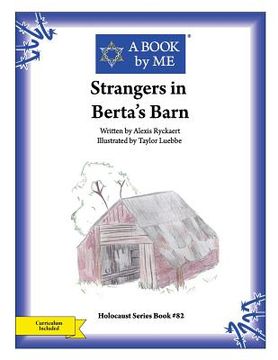Reseña del libro "Strangers in Berta's Barn (en Inglés)"
Jeno László Berta was born in Hungary in 1937. His Catholic parents had two other children, a son named Vendel and a daughter named Maria. They lived happily together in a small farming village. Jeno's grandparents lived nearby. The people of the region had very limited transportation so they walked, or they rode bicycles or on horse-drawn wagons. There was no electricity or running water. Their peace ended when the Nazis occupied Hungary in 1944. "After this, there was no freedom," recalls Jeno. The first thing he noticed was their abuse of both people and animals. The Nazis went house-to-house marking the number of residents on each door. The number five was marked on the Berta family door to indicate young Jeno, his parents and siblings. They would not dare to use more than five plates or cups for fear of questioning. As a six-year-old, Jeno witnessed the fate of Hungarian Jews from Pápa, a town 80 kilometers away. They were marched across town and loaded onto trucks bound for concentration camps. The locals believed the Nazis were doing this for show-to remind people what could happen to them. Jeno was struck by the injustice of it all. Seventy years later, he recalls, "A Nazi kicked over a bench with water, milk, bread and apples that my mother and grandmother had set out for the poor Jewish people. It was an effort to offer them something." The Berta family decided to hide a local Jewish family. In doing so, they realized they risked their own lives. Jeno's father brought home the Bognár family in the wagon with the last load of corn for the season. The family of four was cold, wet, hungry and very frightened. They found their safety and salvation in a humble farmhouse. The Berta family kept the Jewish stowaways warm and provided food. They moved into the family's barn. It was the warmest place to offer their guests. The family's dogs were an "alarm system," barking when anyone approached. This was their routine through April 1945, when Russian troops liberated their town. The Nazis left the village, and the Jewish family was able to return to their own home. The Berta family dropped them off at the train station so they could return to Pápa. Years later, their daughter Drozsike and Jeno's sister Maria worked together as nurses at a hospital in Csór, Hungary. The Soviet troops did not allow anyone to feel free, even after the war's end. They closed the churches down and there was no freedom. One form of tyranny had replaced the other. Jeno sums it up this way: "People say the war was over in 1945. I don't think so. The only difference between the SS [Nazis] and the KGB [Soviet Communists] was the language they spoke and their uniforms." Jeno left home, fleeing to the USA. He calls America the "Land of Opportunity." He landed in Davenport, Iowa in March of 1957 and this is the place he has called home ever since. He met his wife Catherine at a McDonald's. They had been married for 48 years, 8 months, and 9 days when she passed away. Jeno worked for the Riverside Foundry/Sivyer Steel and is past president of the United Auto Workers Local 377. In 1989, he became the owner of Jeno's Little Hungary, a bar and grill in northwest Davenport. His son, Major Jeno Berta, Jr., is a soldier assigned to the First Army at Rock Island Arsenal in Rock Island, Illinois. He's married to a Jewish woman, Dawn Strauss-Berta. They have two children, Cassie and Carly. Cassie sang the National Anthem before her grandfather spoke at a Holocaust Remembrance at the Rock Island Arsenal in April of 2014. She made her grandfather very proud. Jeno Berta is a proud American and a righteous man.

